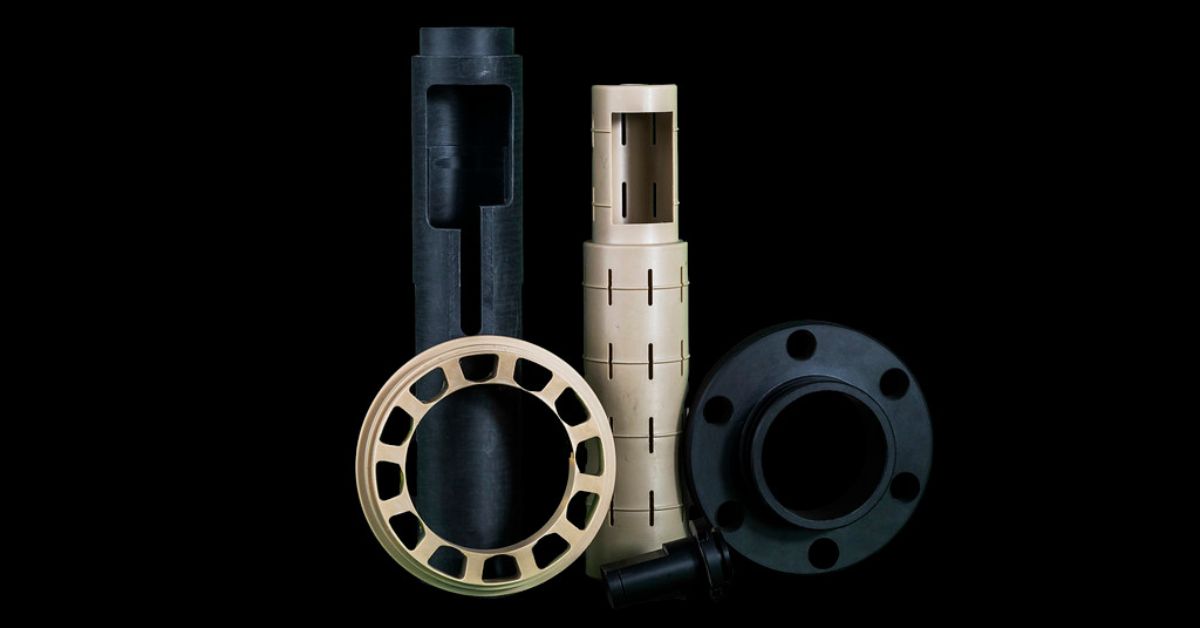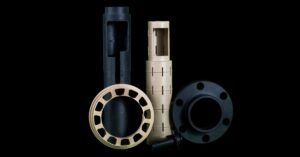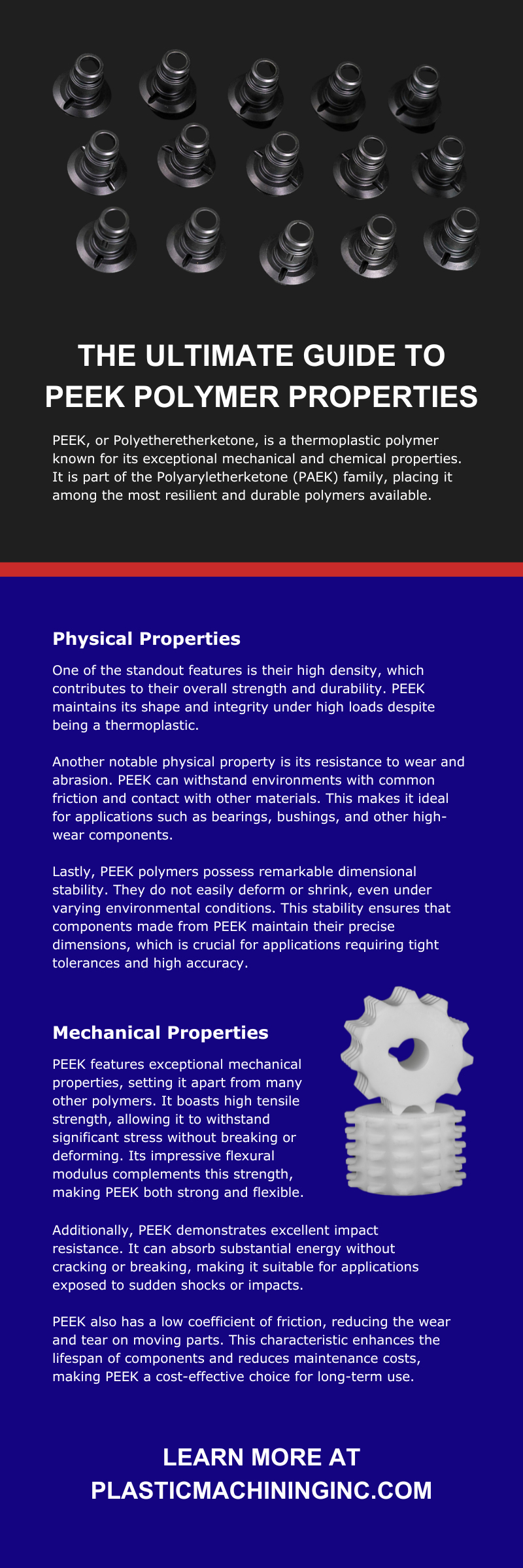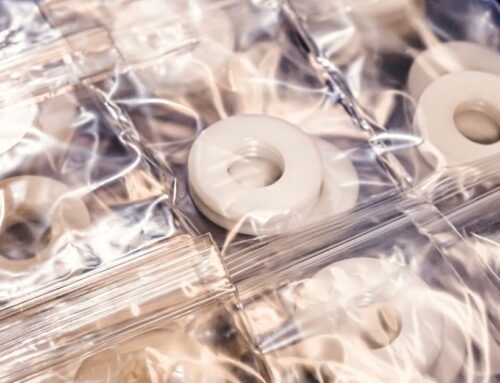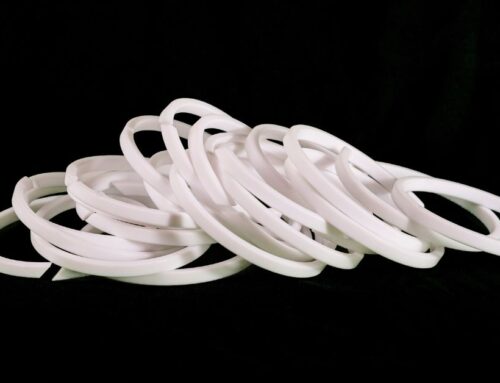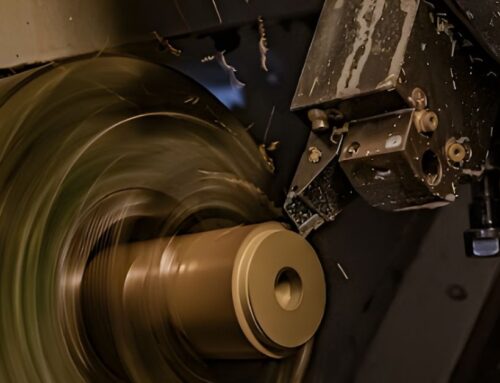In the engineering and manufacturing industries, materials make all the difference. PEEK (Polyetheretherketone) stands out among the various materials available as a versatile, high-performance polymer.
If you are an engineer or a manufacturing professional, understanding PEEK’s properties and applications can hold many benefits for your projects. This ultimate guide to PEEK polymer and its properties will provide a comprehensive look at this material, from its basic definition to its benefits and uses in different industries.
What Is PEEK Polymer?
PEEK, or Polyetheretherketone, is a thermoplastic polymer known for its exceptional mechanical and chemical properties. It is part of the Polyaryletherketone (PAEK) family, placing it among the most resilient and durable polymers available.
PEEK’s unique structure allows it to maintain its integrity under extreme conditions. It comprises ether and ketone groups, which contribute to its high thermal stability and chemical resistance. These characteristics make PEEK more than just another plastic—it is a specialized material capable of replacing metals and other traditional materials.
PEEK’s versatility extends beyond its physical attributes. It is also highly machinable, making it easier for manufacturers to shape it into complex forms. Companies that manufacture high-stress components find PEEK particularly useful for its reliable performance. This flexibility adds to its utility, offering engineers a broader range of design possibilities without compromising quality or performance.
How Do Manufacturers Make PEEK Polymers?
Manufacturing PEEK involves a multi-step process that ensures its high performance and durability. The production begins with synthesis of two monomers: hydroquinone and difluorobenzophenone. These monomers undergo a polymerization process where they react under specific temperature and pressure conditions to form the PEEK polymer chain.
The polymerization process takes place in a controlled environment to maintain the quality and consistency of the final product. Once the polymer chains form, manufacturers will cool them and allow them to solidify. This initial form of PEEK is usually a granulate, which you can then process into various shapes and forms through methods such as injection molding, extrusion, and compression molding.
Properties of PEEK Polymers
Understanding the properties of PEEK polymers is essential for leveraging their full potential in engineering and manufacturing applications. Below, we summarize the key physical, mechanical, thermal, and electrical properties that make PEEK an outstanding material choice.
Physical Properties
PEEK polymers exhibit excellent physical properties that make them suitable for various applications. One of the standout features is their high density, which contributes to their overall strength and durability. PEEK maintains its shape and integrity under high loads despite being a thermoplastic.
Another notable physical property is its resistance to wear and abrasion. PEEK can withstand environments with common friction and contact with other materials. This makes it ideal for applications such as bearings, bushings, and other high-wear components.
Lastly, PEEK polymers possess remarkable dimensional stability. They do not easily deform or shrink, even under varying environmental conditions. This stability ensures that components made from PEEK maintain their precise dimensions, which is crucial for applications requiring tight tolerances and high accuracy.
Mechanical Properties
PEEK features exceptional mechanical properties, setting it apart from many other polymers. It boasts high tensile strength, allowing it to withstand significant stress without breaking or deforming. Its impressive flexural modulus complements this strength, making PEEK both strong and flexible.
Additionally, PEEK demonstrates excellent impact resistance. It can absorb substantial energy without cracking or breaking, making it suitable for applications exposed to sudden shocks or impacts.
PEEK also has a low coefficient of friction, reducing the wear and tear on moving parts. This characteristic enhances the lifespan of components and reduces maintenance costs, making PEEK a cost-effective choice for long-term use.
Thermal Properties
One of the most significant advantages of PEEK polymers is their high thermal stability. PEEK can withstand continuous use at temperatures up to 240°C without losing its mechanical properties. This capability makes it suitable for applications in extreme thermal environments, such as engine components and industrial machinery.
PEEK also exhibits excellent thermal conductivity, efficiently dissipating heat away from critical components. This property is crucial for maintaining the performance and longevity of devices exposed to high temperatures.
Furthermore, PEEK has a very low thermal expansion coefficient. It does not expand or contract significantly with temperature changes. This characteristic ensures that components can retain their fit and function across a wide temperature range.
Electrical Properties
PEEK polymers have a high dielectric strength, allowing them to withstand high voltages without breaking down. This property is essential for insulating components in high-voltage environments.
Additionally, PEEK has a low dielectric constant and dissipation factor value. These properties ensure minimal energy loss and signal degradation, making PEEK suitable for high-frequency applications such as connectors and insulators.
PEEK also exhibits excellent resistance to electrical tracking and arcing. This resistance enhances the safety and reliability of electrical components, especially in harsh environments where electrical failures can have severe consequences.
Applications of PEEK Polymers
The unique combination of PEEK’s properties presents various applications across various industries. In the aerospace industry, PEEK makes up components that require high strength, thermal stability, and lightweight characteristics. Some examples include aircraft interiors, structural components, and insulation for wiring systems.
In the automotive industry, manufacturers and engineers utilize PEEK for parts that must withstand high temperatures and mechanical stress, such as engine components, transmission parts, and seals. Its wear resistance and low friction properties also make it ideal for bearings and bushings.
PEEK is also a common material in the medical field. Its biocompatibility and sterilization resistance make it suitable for implantable devices, surgical instruments, and dental components. Additionally, PEEK’s radiolucency allows for clear imaging without interference, enhancing its suitability for medical applications.
Other industries benefiting from PEEK include oil and gas, electronics, and industrial machinery. Its versatility and high performance make it a go-to material for any application requiring exceptional durability and reliability.
Where To Find PEEK Polymers for Your Business
If you’re considering incorporating PEEK polymers into your projects, finding a reliable supplier is crucial. Plastics Machining Inc. is a trusted provider of high-quality PEEK plastic materials. We offer a wide range of PEEK products tailored to meet the specific needs of various industries.
Plastics Machining Inc. ensures that our PEEK materials undergo rigorous quality control to meet industry standards. Our expertise in machining and fabrication guarantees that you receive top-notch components at fair prices.
For more information on how Plastics Machining Inc. can support your business with PEEK polymers, visit our website or contact our team for personalized assistance.
PEEK polymers offer unparalleled advantages for engineers and manufacturing professionals. Their unique physical, mechanical, thermal, and electrical properties make them a versatile and reliable choice for a wide range of applications. By understanding the strengths of PEEK polymers, you can make informed decisions that enhance the performance and durability of your projects.
If you’re ready to explore the potential of PEEK polymers further, consider reaching out to Plastics Machining Inc. Our expert team can provide the guidance and materials you need to elevate your engineering and manufacturing endeavors. Don’t miss out on the opportunity to harness the power of PEEK in your next project.
